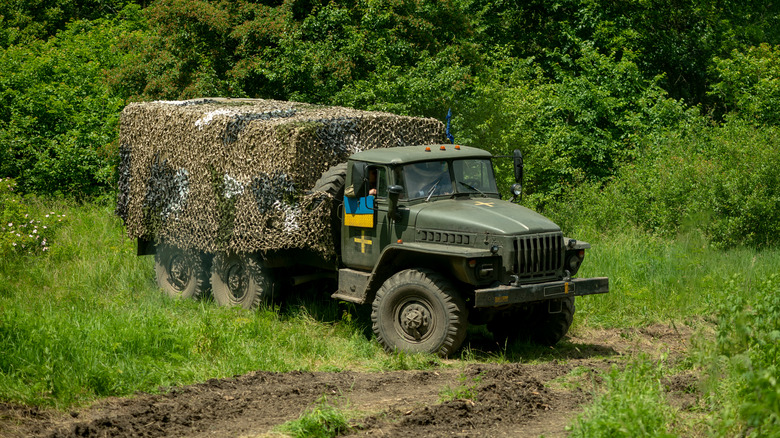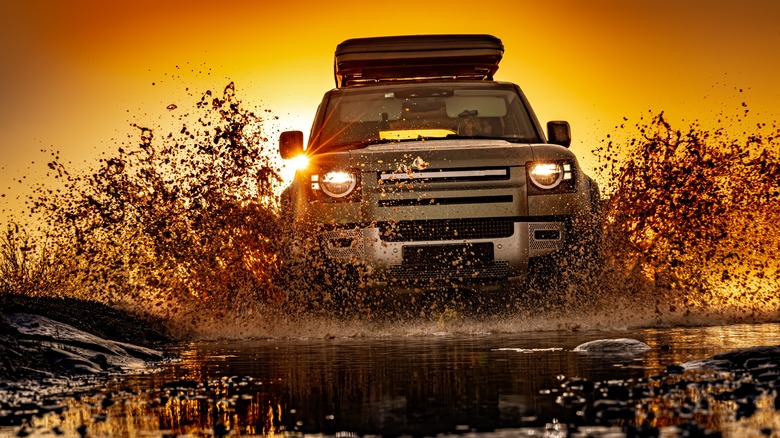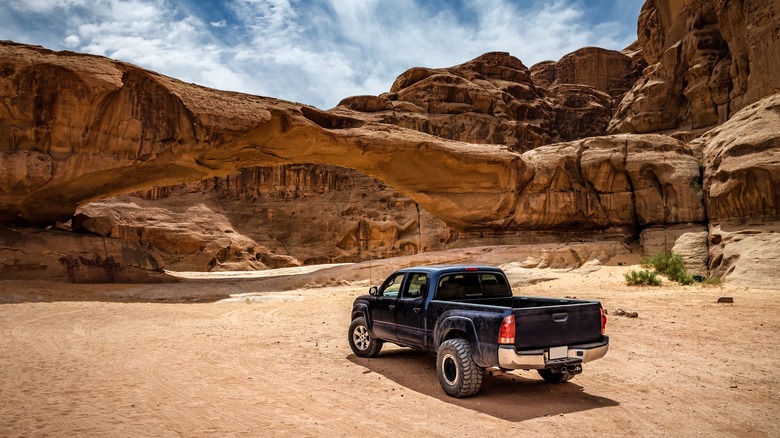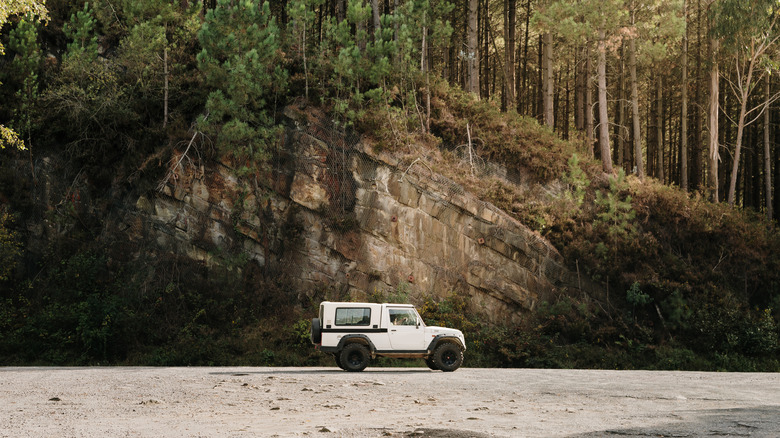Are Gas Or Diesel Trucks Better For Off-Roading?
A lot of drivers spend the majority of their time behind the wheel on smooth, comfortable, familiar tarmac — if they're lucky enough that the roads they commonly travel on are well-maintained, anyway. The United States boasts such famous roads as Route 66 and the Blue Ridge Parkway, after all, and their allure is undeniable. What we always want to do, though, is match our vehicle to the type of driving we plan to do. Off-roading has its own unique appeal.
What could be more liberating than quite literally heading off the beaten track in a rugged and capable vehicle that loves to do just that? If you're in the market for a new truck and you have just this in mind, there's one key factor that you'll want to explore: Gas versus diesel.
Both diesel and gas have their virtues in different areas, as always, but off-roading is an element that has its own unique effects on the way a truck performs and its requirements. The first thing we'll explore in order to help with an ultimate decision is the different impact that driving off-road can have on a truck compared to roads.
What's different about driving off-road?
Off-roading isn't concerned with one specific type of terrain. Depending on where you're traveling, the terrain you're contending with could be the thickest of mud, the slushiest of snow, the most uneven of gravel, or anything in between.
If you're averse to getting your truck particularly dirty, or wish to avoid the risk of having to be hauled out of some particularly troublesome mud altogether, off-roading might be a rather tricky sell for you. Serious off-roaders will be familiar with the need to keep the likes of recovery gear, jacks, and first aid kits in their vehicle, and equipment that make a truck better suited for such adventurous endeavors.
While roads are smooth, consistent surfaces, intended to aid as much as possible with our tires' ability to grip (and therefore control predictably and safely), this luxury typically isn't afforded by other terrain. To suit off-road travel, then, vehicles like 4x4s often have more width to the treads of their tires and are higher off the ground — the better to traverse more difficult paths. Unpredictable ground can also make your vehicle work harder in various ways, with frequent gear shifts coming with changes of elevation. A formidable (noisy) diesel truck may be able to cope better, and we'll take a look at why that is.
Off-roading in a diesel truck
Some of the unique characteristics of a diesel truck may help make it a preferable choice for driving off-road. Firstly, and most prominently, there's the engine itself. Unlike a conventional gas engine, a diesel model is powered by compressed air, which provides the flame needed to power the system when blended with the diesel itself.
To aid in this process, diesel is rather different from gasoline. It has a higher density than an equivalent amount of gas (a gallon of diesel weighing slightly over seven pounds), and is also packed with around 36.9 megajoules per liter of energy compared to gas' approximate value of 33.7 megajoules per liter. This translates to an engine that typically runs more efficiently than an equivalent gas model.
The U.S. Energy Information Administration also notes that the dangers of stalling are lessened in a diesel vehicle, which can offer a little more security if maneuvers that are out of the norm are necessary. Stalls, unfortunately, can be all but impossible to predict in off-roading driving scenarios. Overall, though, efficiency and reliability can be cornerstones of off-roading, where even the most experienced of drivers can run into unforeseen situations.
Combine this with the improved mileage a diesel can offer: Such an engine frequently has around a 20-35% better fuel economy than gas according to the U.S. Department of Energy. Diesel presents itself as a solid choice for off-road travel, where gas stations can be few and far between.
Other vital considerations
Though the potential virtues of diesel engines for off-roading are considerable, it's important to note that there are many other variables to consider. Such an engine can potentially stall just as a gas one can, even if it's less likely because the lower RPM and heightened torque of diesel can better manage uneven ground.
It's certainly not as easy as saying that a diesel engine will always be better for off-roading. What a driver will need to do is carefully consider the type of terrain they'll (typically) be covering, because this can make a big difference. Diesel engines can be more efficient, but they will also tend to weigh more. As a result of the average disparity between compression ratios for diesel and gas (20:1 and 8:1 respectively), the weight difference between the two types of engines can be considerable. This can be a poor match for particular types of terrain like mud, which can be taxing on the front axle.
Though a diesel engine may afford a driver better mileage, this doesn't necessarily make diesel trucks cheaper for off-road purposes. In fact, the additional expense of the refinement associated with the production of diesel as the process has developed often translates to higher prices at the pump. Data from the U.S. Energy Information Administration for the beginning of April 2024 notes that all grades of gasoline had a weekly retail price of $3.636 per gallon, while ultra low sulfur diesel hit $3.996 per gallon.
More on the price disparity
Whether the efficiency of a diesel engine outweighs the often-pricier nature of filling it with gasoline will depend on a specific vehicle's performance. That increased torque can be an enormous factor in your decision between a gas or diesel truck for off-roading. Diesel engines are often seen in military vehicles, larger trucks, and the like, as their greatest strengths lie in something quite unique: Strength, rather than raw speed.
A truck boasting the increased torque of a diesel engine can be an especially suitable off-roading companion for those aficionados who know exactly where they're going, what the ground will be like for the journey, and the gear they may need (both the essentials and the emergency items) to handle that. Carrying weight is not as detrimental a factor as it may be for a different vehicle.
Meanwhile, a gas engine can be faster in optimal conditions. According to Transwest Ford, gas trucks will typically have around 50 more horsepower than a diesel one, which can translate to a considerably higher top speed. As always, though, potential top speed is far from a pace that will be consistently achieved by a given vehicle, and factors such as the terrain covered and passenger/load weight can have a huge impact on it. As such, gas trucks can have their own advantages in an off-road scenario, but an equivalent diesel machine may somewhat negate them.
Overall, does diesel or gas suit off-roading better?
In brief off-road trail trips, you probably won't have an excess of weighty supplies in your truck — and, by extension, won't necessarily have to be driving a rugged diesel machine. Shorter off-road trips, perhaps especially in a muddy locale, could be a better fit for a gas rig (the crucial filters of a diesel engine won't appreciate such ground either).
What a diesel engine tends to do very well, meanwhile, is maintain efficiency and performance during longer, more challenging drives, with powerful torque providing the momentum to climb the inclines a driver may face during more elevated off-road adventures.
Diesel trucks are better suited to longer journeys, too, because this is where their potentially superior operating economy can shine. A diesel engine may also last longer, partially owing to the fact that such engines operate at a reduced RPM and so aren't necessarily pushing themselves as hard. The almost-self-lubricating nature of diesel itself, too, promotes longer life.
Though maintenance may be more complex and costly for a diesel model, it's vital to note that so much depends on the specific vehicle and terrain: Newer diesels can be developed to be much less heavy in a relative sense, and there's ultimately no definitive answer to whether diesel is better for off-roading than gas, though its traditional strengths relative to the latter may tend to favor off-road use. Keep your intended use cases in mind, along with your particular prospective vehicle's capabilities.





